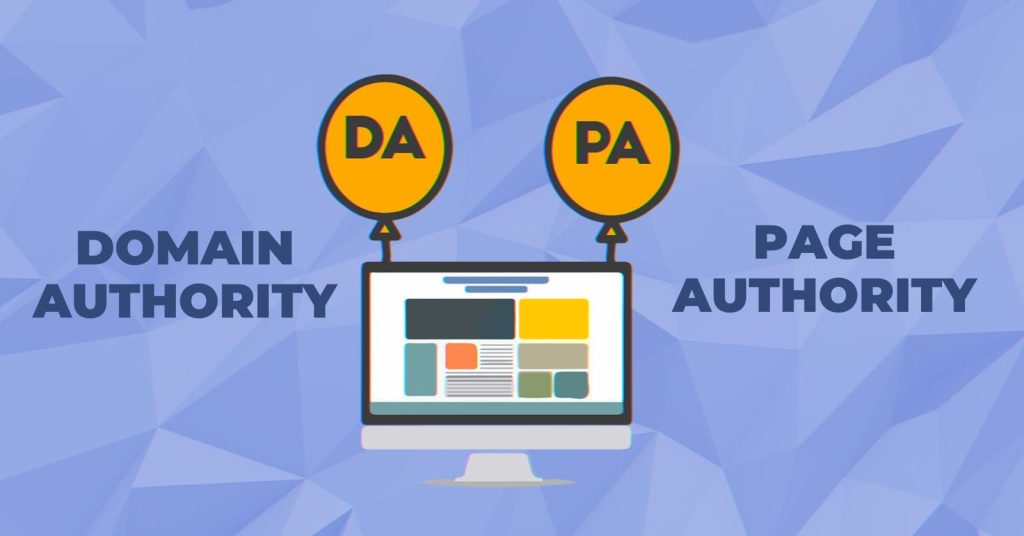
What’s More Important: Page Authority VS Domain Authority?
Page authority vs domain authority: The two most relevant SEO terms. Learn about their differences and importance.
In this article, we would be discussing everything you need to know about DA and PA , also mentioning Domain authority vs page authority.
An authority score is a qualitative measure that determines how visible and ranking a web property is in search results.
As Most SEO experts focus on authority, and for good reason. The main purpose of most SEO tactics, such as producing informative content and building links, is to increase authority.
What is Page Authority(PA)?

Page Authority (PA) is a metric that is used to measure the strength of a specific page within a website. It is similar to Domain Authority, but instead of measuring the strength of the entire website, it measures the strength of a single page. The score is represented on a scale of 0 to 100, with a higher score indicating a more authoritative page.
Page Authority is calculated by analyzing a variety of factors, such as the number and quality of backlinks pointing to the page, the relevance and content of the page, and the overall popularity of the website. Pages with a high Page Authority are more likely to rank well in Google SERP (search engine results page), as they are considered to be reliable and trustworthy sources of information.
Factors Impacting Page Authority:
There are several elements that are used to calculate Page Authority, including:
- Number of Backlinks: The number of backlinks pointing to a specific page is one of the most important factors used to calculate Page Authority. The more high-quality backlinks a page has, the more authoritative it is considered to be.
- Quality of Backlinks: The quality of the backlinks pointing to a specific page is also important. Backlinks from reputable and high-authority websites are considered to be more valuable than those from low-authority websites.
- Relevance of the content: The relevance of the content on the page to the backlinks and search queries it aims to rank for is also important.
- Popularity: The popularity of the website as a whole, as measured by factors such as the number of visitors and social media shares, can also be taken into account when calculating Page Authority.
- On-Page Optimization: Properly optimizing the page using elements like header tags, meta tags, keyword density, internal linking, meta descriptions etc can also help to boost a page’s authority.
- User engagement: User engagement like click-through rate, time on site, bounce rate, pages per session, etc can also have an impact on the page authority.
What is Domain Authority(DA)?

Domain authority (DA) is a metric that is used to measure the strength of a website. It is a score that is calculated by analyzing a variety of factors, such as the number and quality of backlinks, the age of the website, and the content on the website. The score is then represented on a scale of 0 to 100, with a higher score indicating a more authoritative website.
A website with a high domain authority is considered to be a trusted and reliable source of information and is more likely to rank well in search engine results. It’s important to note that Domain Authority is a comparative metric and it’s used to compare one site against another, rather than an absolute value.
Factors Impacting Domain Authority:
There are several elements that are used to calculate domain authority, including:
- Number of Backlinks: The number of backlinks pointing to a website is one of the most important factors used to calculate domain authority. The more high-quality backlinks a website has, the more authoritative it is considered to be.
- Quality of Backlinks: The quality of the backlinks pointing to a website is also important. Backlinks from reputable and high-authority websites are considered to be more valuable than those from low-authority websites.
- Popularity: The popularity of a website, as measured by factors such as the number of visitors and social media shares, can also be taken into account when calculating domain authority.
- Age: Websites that have been around for a longer period of time are generally considered to be more authoritative than newer websites.
- Content: The quality and relevance of the content on a website can also be used to calculate domain authority. Websites that provide useful, accurate and up-to-date information are generally considered to be more authoritative than those that do not.
- Social Signals: Social signals like shares, likes, comments, etc on different platforms like Facebook, Twitter, etc are also considered to be important elements in determining the domain authority.
How to calculate DA & PA?

Domain Authority (DA) vs Page Authority (PA) are metrics that are calculated by analyzing a variety of factors.
Both DA and PA are determined by using a proprietary algorithm developed by Moz, which takes into account a number of different factors when calculating the score. The score is then represented on a scale of 0 to 100, with a higher score indicating a more authoritative website or page.
While the exact algorithms used to calculate DA and PA are not publicly available, it’s generally understood that the metrics are based on a combination of factors such as:
- The number of backlinks pointing to the website or page
- The quality of those backlinks
- The relevance and content of the website or page
- The popularity of the website or page
It’s important to note that while these metrics can be used as a general guide to the strength of a website or page, they are not the only factors that determine search engine rankings. Additionally, the algorithm used to calculate DA and PA may change over time, so it’s important to keep this in mind when assessing the authority of a website or page.
Domain authority vs page authority:

Lets dive into the major differences between Domain authority vs page authority:
| Factors | Domain Authority | Page Authority |
| Scope | Measure of the overall strength of a website. | Measure of the strength of a particular page within a website. |
| Calculation | Takes into account a variety of factors such as the number and quality of backlinks, the age of the website, and the content on the website. | Takes into account factors such as the number and quality of backlinks pointing to the page, the relevance and content of the page. |
| Usage | Used to compare one website against another. | Used to compare one page against another. |
| Impact on SEO ranking | Both can impact a website’s search engine rankings. | Both can impact a website’s search engine rankings. |
| Changes | Changes less frequently than Page Authority as it depends on factors that are relatively stable like the number of backlinks and the website’s age. | Changes more frequently as it depends on factors that may change frequently like the number of backlinks pointing to the page and the content of the page. |
| Domain Specific | Specific to a domain or subdomain and can’t be transferred to other websites or pages. | Can be transferred to other pages within the same website through internal linking and navigation. |
| Relevancy | May not be as relevant to a specific page or content. | More relevant to a specific page, relevance, and quality of the content on the page. |
| Comparisons | When comparing different websites, Domain Authority is generally a more useful metric as it provides an overall picture of a website’s strength. | Page Authority is a more useful metric as it gives a better understanding of the strength of individual pages. |
| Long term impact | Building a high Domain Authority takes time, effort, and consistent work. | Improving the Page Authority of a page may have a more immediate impact on rankings. |
Also Read: On page SEO vs Off Page SEO
Top 5 Tools to Calculate DA & PA:
There are several SEO tools available that can be used to calculate Domain Authority (DA) and Page Authority (PA). Some of the top tools include:
- Moz: Moz is one of the most popular and widely used tools for calculating DA and PA. It provides detailed metrics and analysis of a website’s backlinks, content, and overall authority.
- Ahrefs: Ahrefs is another popular tool that can be used to calculate DA and PA. It offers a wealth of data and insights on backlinks, keywords, and content, allowing you to see how your website compares to others in your industry.
- SEMrush: SEMrush is a comprehensive digital marketing tool that offers a range of features and data, including domain and page-level analytics, backlink analysis, and keyword research.
- Majestic: Majestic is a backlink analysis tool that can be used to calculate DA and PA. It offers detailed information on backlinks, including anchor text, referring domains, and trust flow.
- Open Site Explorer: Open Site Explorer is a tool that can be used to calculate DA and PA. It offers data on backlinks, social activity, and on-page optimization, allowing you to see how your website compares to others in your industry.
Conclusion
Hence, Domain Authority (DA) vs Page Authority (PA) is not debatable as both metrics are used to measure the strength of a website or a specific webpage. Both metrics are determined by analyzing a variety of factors. They are both important metrics to consider when assessing the strength of a website or page and can play a role in determining search engine rankings.
Also Read:
Let’s dive in! Get started for free
